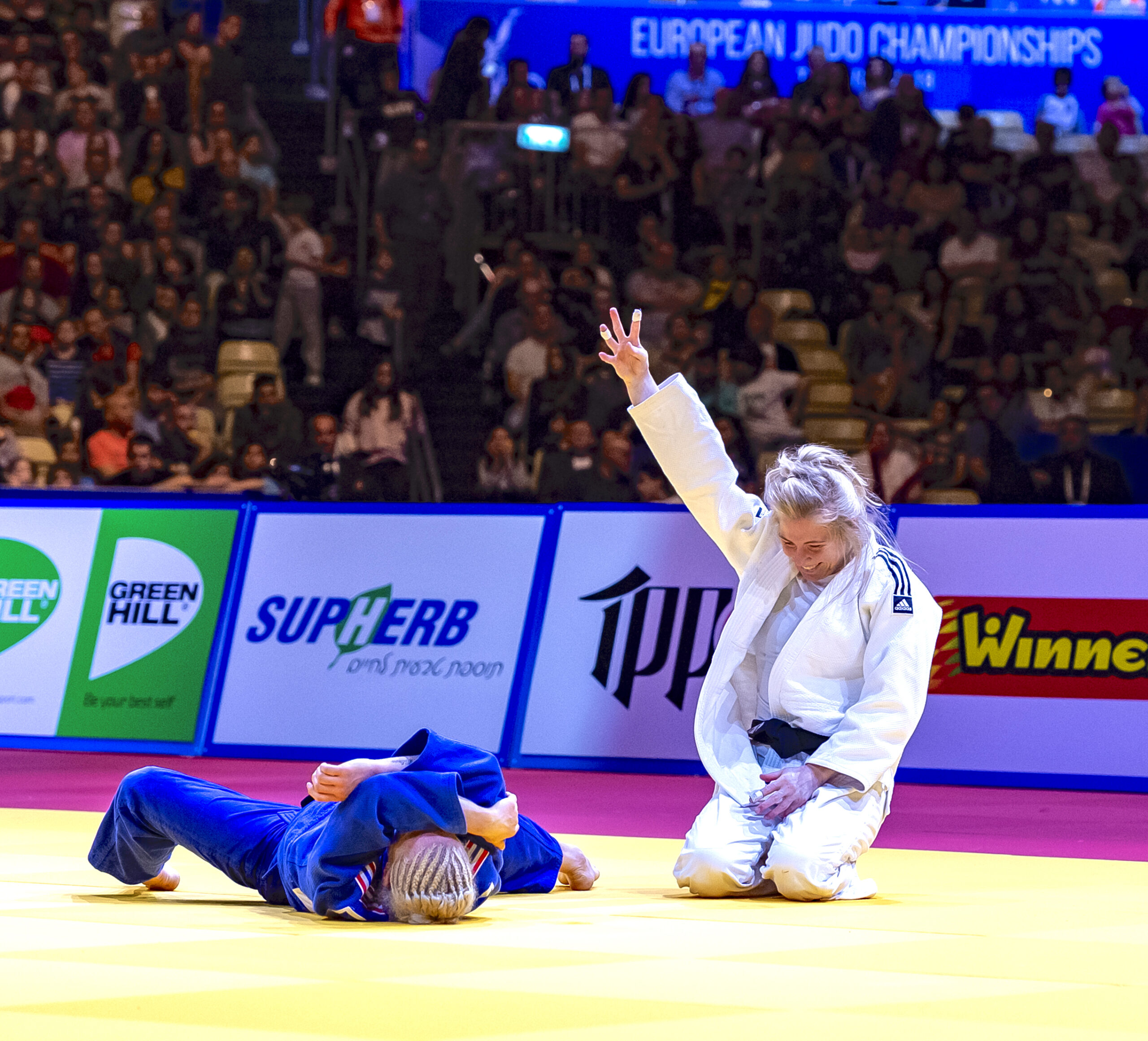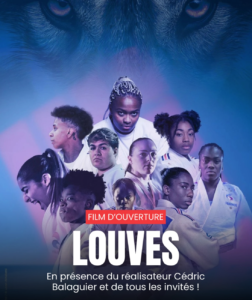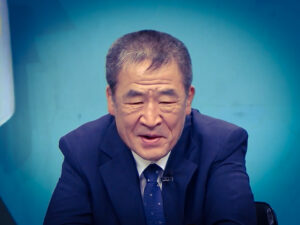Born on February 8, 1991, in Zevenhuizen (Netherlands), Kim Polling first made a thunderous entrance. Paris, February 10, 2013. A clamor in the warm-up area. On the giant screen, the unthinkable. Lucie Décosse, Olympic title holder and winner of the last two World crowns, six-time winner of the French Grand Slam, had just been lifted off the ground and flattened with an ura-nage with an insolence and authority never before seen in this U70kg category that the Porsche from Cayenne had locked down since moving up from U63kg four seasons earlier. A few minutes later, her uninhibited conqueror, a Dutch woman ten years her junior, 1.74 meters tall with a proud bearing, crossed the warm-up mat as if nothing had happened. In her wake, an admiring silence. Something of a coronation. Like an embodiment of « This Girl Is on Fire » sung by Alicia Keys on all the radio waves that winter.
The next day, at the traditional international training camp following the Paris Grand Slam, I brought out my best lasso to intercept this smiling cyclone who had just won two tournaments in one week with a rarely seen margin. We took our seats in the stands of the Institut du judo for the first of a long series of interviews. During it, the 2010 junior European and World champion showed me a discreet tattoo in the hollow of her left wrist. It depicted Simba as Rafiki, the mandrill from The Lion King, paints it on a tree. It was the favorite cartoon of the older of her two little brothers, who had passed away far too soon. The tattoo was a few days old. A trigger, perhaps. In any case, we would never speak of it again.
The following summer we would call each other often, during a serialized story published in the fall in the French bimonthly magazine L’Esprit du judo and titled ‘A Summer with Kim Polling’ – a format that will catch on with champions like Marti Malloy, Andreea Chitu, or Loïc Pietri. And what a summer! The overwhelming favorite for the World title after a more than perfect first half of the year, she would finish « only » third at the Maracanazinho in Rio de Janeiro. Due to a knee injured a few weeks earlier during the grueling international training camp in Castelldefels, Spain, then aggravated by extra-judo hassles. She was then twenty-two years old with her whole life ahead of her following the long years of reign by her elder Edith Bosch. Yet this would be her only medal at that level.
Twelve seasons and many twists and turns later—visible and less visible injuries, comebacks, federation tensions, motherhood, change of nationality—the woman who awakened to judo alongside the late Wubbo Zuidland took care to send a delicate personalized message just before making her retirement official. In return, we agreed on the principle of this interview to symbolically close the loop of exchanges that never really stopped, even crossing paths sometimes at Christmas, in judogi and with family around Bardonecchia, in that Italy where she now lives and flourishes. A few months passed, both of us busy. And then we finally sat down and picked up the thread of a conversation that never spoke of anything other than hopes, crossroads and acceptance. – JudoAKD#043.
A French version of this interview is available here.
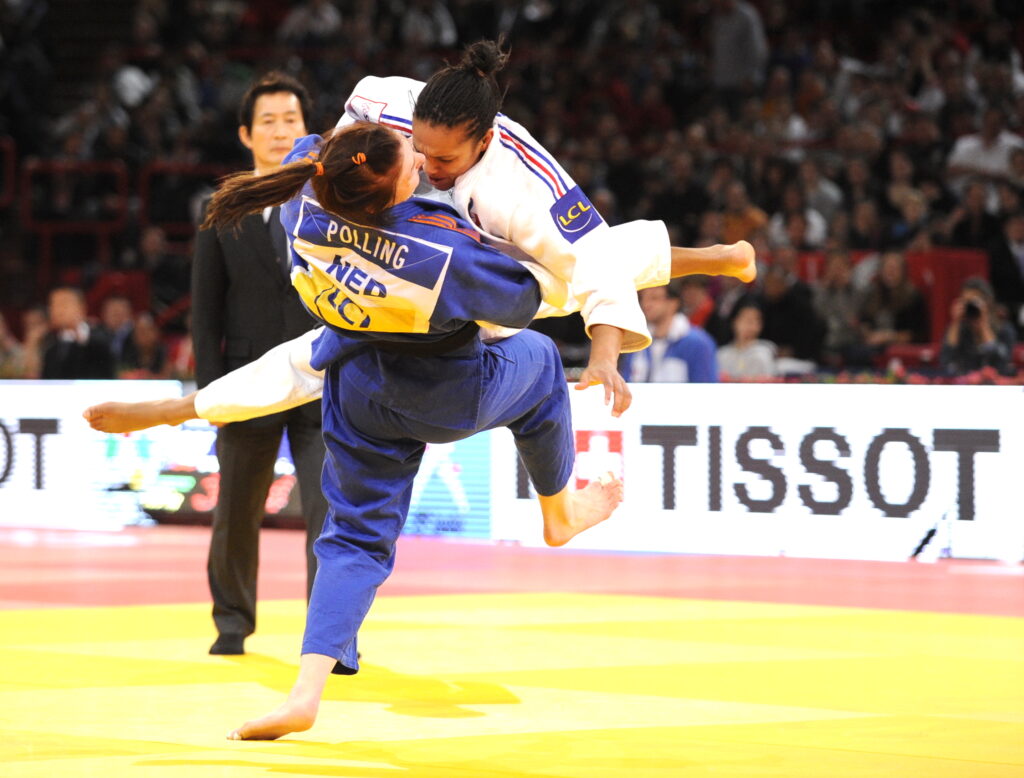
You made your retirement official at the beginning of 2025. At what point did this decision become clear to you?
I decided to stop in January. Initially, I wanted to continue until the World Championships in Budapest in June. However, at the time of the Paris Olympic Games, I had a hernia to treat, and I first needed to recover from that. Then in September, October, I started doing judo again, and we discovered that I also had a shoulder injury. It probably also dated back to the Olympics but, because of all the medication I was taking to treat my hernia, I hadn’t noticed it. So in October, I finished my rehabilitation for the hernia, and then I started another one for my shoulder. I finished in December, and then I asked myself: OK, but can I really?
Not to mention that you’re a mother…
Yes, I also had the factor of my daughter, of course. At that point she was still two years old, but she was becoming much more « intense. » Before she was a baby, it was easy, I could take her everywhere. Now, she was two years old, and it was a bit more difficult. So I started thinking, well… We discovered that I had a hernia immediately after the World Championships in Abu Dhabi in May 2024. So in total, apart from the day of the Olympics, I didn’t do judo for six months, from June to December. And now I have to come back and, at home, I can’t rest as much as I need to with Aurora needing attention. So what’s the probability that I can really come back well now, when before the Olympic Games I wasn’t already at my level? That’s when I told myself, well, maybe it’s just time to stop, even though I would have preferred to continue.
You weighed the pros and cons, basically…
Yes, and there were too few yeses and too many nos.
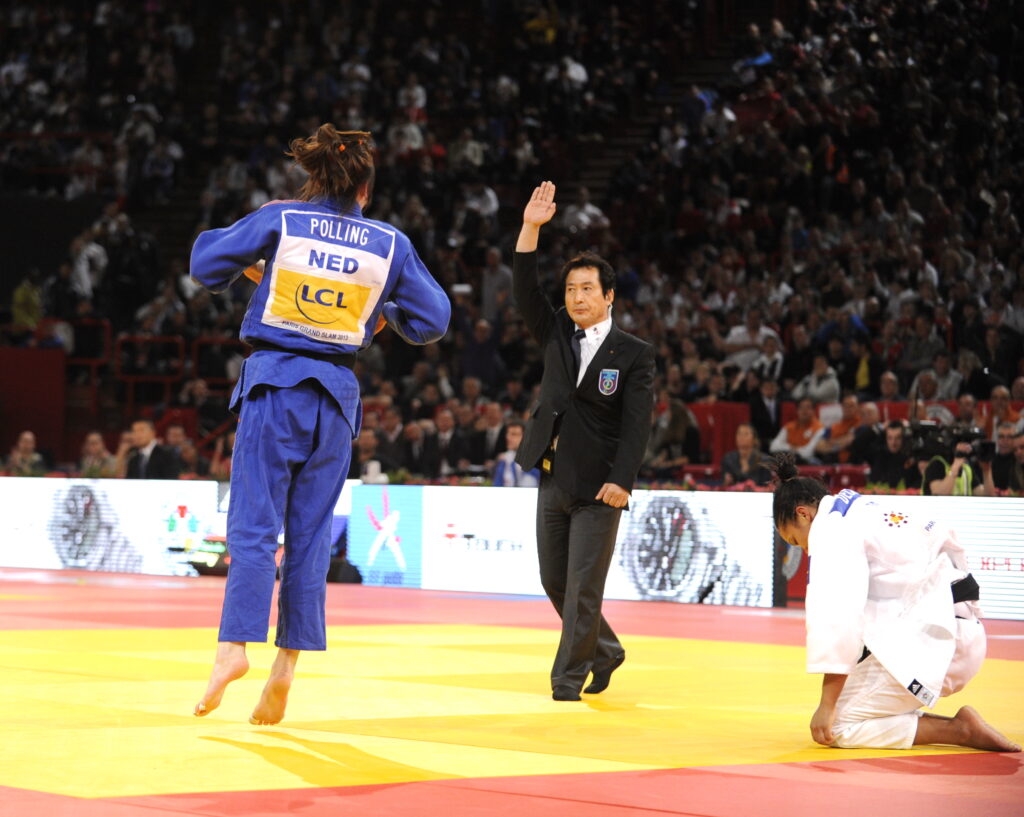
With the perspective of a few months, did you make the right decision?
Yes. Everything is going very well. First thing, I don’t miss judo at all. I imagined it would be the opposite, especially regarding tournaments. But waking up in the morning and being able to immediately use my hands, stretch my knee and move, it’s just great actually. Of course sometimes my knee or my back still hurt. But it’s nothing compared to when I was competing.
Professionally, are you finding your footing?
Yes, I immediately found work. Starting in January, I began working as a Dutch teacher, only on Saturdays. And then in March, I received a call from another school in Turin to teach English during the week. All of this keeps me busy and I love this teaching work. Moving on so quickly allowed me to avoid having to face that black hole that other athletes sometimes confront at this point in their career.
What about judo?
Judo is never very far away, obviously. I’m elected to the IJF Athletes’ Commission. There’s also my husband’s judo school where I handle the secretarial work. So I’m quite busy. I have to say that the only thing I really miss about the athlete’s life is rest. You know, that rest that we need to have the wisdom to know to take in order to recover. Because that, of course, we no longer have. Things move too quickly. But it’s without regrets because I’m really happy with the way things have been going since my retirement.
What age group do you teach?
I’m an English teacher for children aged four to five. They have Italian parents, but the parents would like half the day to be in English and the other half in Italian. Some children also speak English at home, which obviously facilitates progress. Others are more Italian and you have to push a little more to get the English out, but they generally understand well… Actually it’s as if they’re growing up with English from age three. And I think in Italy particularly it’s a good thing because English until now wasn’t yet so developed… On Saturdays I teach Dutch in Milan so I have to travel a bit, but I really like it so it works for me. Actually I go to Milan twice a month and twice a month the classes are online, so it works well.
Do you also teach judo?
No. This will surprise you but I don’t like teaching judo. I’ve never liked it. I also don’t like running training camps. Doing the club’s secretarial work suits me very well. Especially since it’s also my husband’s club so it’s perfect.
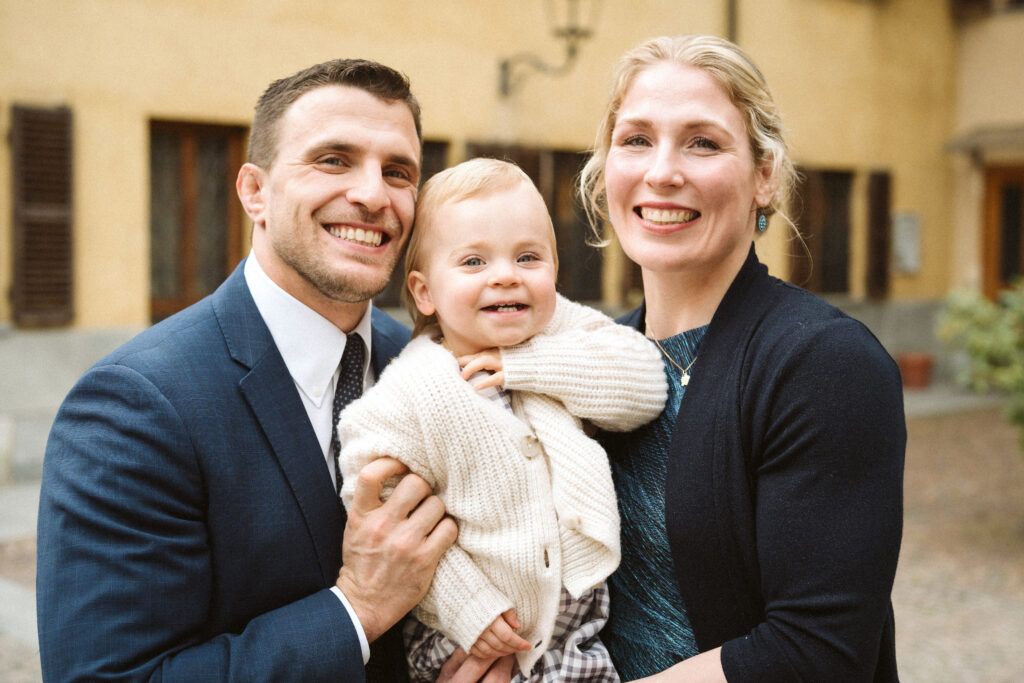
Your husband Andrea also has responsibilities with the Italian Judo Federation, is that right?
Actually his main job is the Army. In Italy, if you enlist with the Army, they find you a job. Andrea works Monday to Friday for the Army. But since 2021, he’s also on the Italian Judo Federation board. And that’s also quite demanding because he’s on the phone a lot. And on top of all that, he runs a judo club with his sister Alessia. So yes I think you can say we’re all quite busy.
That’s good!
You know it was one of Andrea’s big fears for me. He always told me that in Italy it’s not so easy to find a job. When I had the chance in 2024 to be able to compete under the colors of Italy, we thought it would create opportunities for me to enter the Army, but in the end I was too old and no military group wanted me. So Andrea was very nervous and then in the end, in three months, I found the job I just told you about. It was of course a good thing that I spoke English because in Italy, it’s not so common. And that I spoke Dutch, as well… In the end, Andrea was worrying about nothing, even though the real deciding factor was that I joined the Italian team last year. It opened doors for me.
Do you speak Italian fluently too?
I’ve started. I’d like to speak it better because grammar-wise, I still make a lot of mistakes. It’s up to me to make the effort if I want to be understood. You know, if I speak Dutch with my daughter, when we’re outside and people hear me talking to her, they all say: « Oh, how nice that you’re speaking English to your daughter. » I started learning it as soon as I moved to Italy, and I speak it especially with Andrea’s parents. With Andrea, we communicated in English. But then we got stuck at home during the covid period, and that’s when I started trying to speak Italian with him. Today we speak Italian all the time. And when I don’t know the words, I say them in English.
You’ve been living in your husband Andrea’s country for several years. Was it never an option for Andrea to join you in the Netherlands?
We talked about it, but then the Netherlands decided to centralize judo in Papendal. I was living in Haarlem and training at Kenamju, which is near Amsterdam. Papendal, to give you a sense of location, is a forest on the other side of the Netherlands. On paper, I could continue living in Haarlem. But then I would have to travel to Papendal, and that’s when I told myself it would have been really difficult, especially since Haarlem is near the airport. Door to door, in five hours, I was in Italy with Andrea. If I moved to Papendal, it was first of all so I wouldn’t have to live two hours from where I train. But I had nothing else to do there. Moreover, I knew that Andrea had a job in the army and that it guaranteed him a job for life. Quite quickly it became apparent that my future would be in Italy.
You were in the middle of your career when you moved there…
You know, I always thought I would continue competing until thirty-five. But waiting until I was thirty-five to move to Italy and get used to the culture, I told myself, yes, but it will be too late. So when the Netherlands, in 2016, chose to centralize everything in Papendal, I decided to take the plunge and move to Italy.
No regrets?
None. In the end, it’s very good because today we have a house, we have a daughter, we have a dog. I mean, we’ve created our own life. Whereas if I had waited until now to move to Italy, it would have been a real disaster. Already, I wouldn’t have spoken Italian as well. I wouldn’t know anything about the culture, and especially I would have had to find a job, and that would have been really, really difficult. So in the end, it went really well the way we did it and I absolutely don’t regret it.
Making a commitment means putting yourself at risk.
Absolutely. Don’t forget that in 2016 it had only been a year since Andrea and I were together. Our story could just as well not have lasted. But it lasted and it’s still lasting.
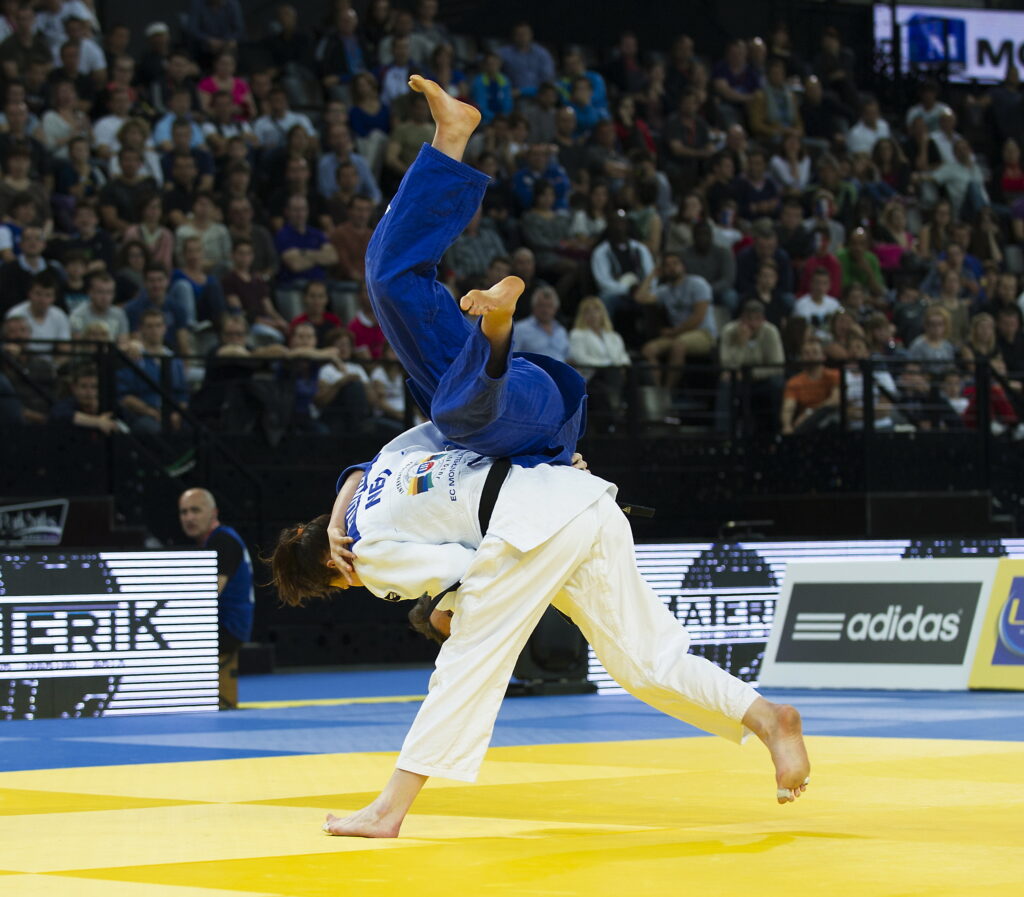
If you had to take stock of these three Olympiads at the highest level, what would be the highs and what would be the lows?
The first high is of course the year of my real arrival on the senior tour, that famous year 2013 when I won almost all the tournaments [six out of eight including the first five, ed. note]. I think it’s surely the most special year of my career.
We saw a hurricane arrive that year, indeed.
Yes, it was incredible. The only downside is that I got injured and at the World Championships, I had to settle for third place. But I gave everything and it remains an incredible year… Then the first low is really in 2014.
Why?
Because I continued winning but I didn’t understand why. Everything seemed so easy that I started wondering how it was possible. That year, flaws appeared in my mental approach but we noticed them too late. At the World Championships in Chelyabinsk everything became strange. I told myself: but how is it possible that I win so easily? So I started training less and less well because I thought, well, maybe if I’m less trained, then it will become a bit more difficult. Remember that at the World Championships in Rio the previous year, I reached the semifinal even though I was injured. I didn’t understand: even being on one leg, I’m still in the semifinal… And right after Chelyabinsk, I didn’t want to do judo anymore. It was terrible.
Yes we had discussed it on site at the time. Things weren’t going well…
Yes. It was really terrible. We understood too late that something was wrong… Beyond myself, all of that made me think about mental health. Ideally, given the extreme demands of the highest level, we should also be monitored when everything is going well, or at least when we think everything is going well. That would allow us to detect in time when something isn’t going well, because it took me quite a while to understand that I wasn’t doing well, and then it was already too late… So in 2014 I was again in the semifinal of the Worlds, but I almost had to be pushed to go back on the tatami. I was there and I didn’t want to fight. In my head I was thinking, yes, but what am I going to say to my coach? I know I’m in the semifinal of the World Championships, but I don’t want to fight anymore. I want to go home. I want to leave. And I can’t… So I stepped on the tatami and obviously I lost. And then I still had to fight for bronze. And I also lost for bronze. Me who hadn’t lost a single fight all year until then… What followed was terrible.
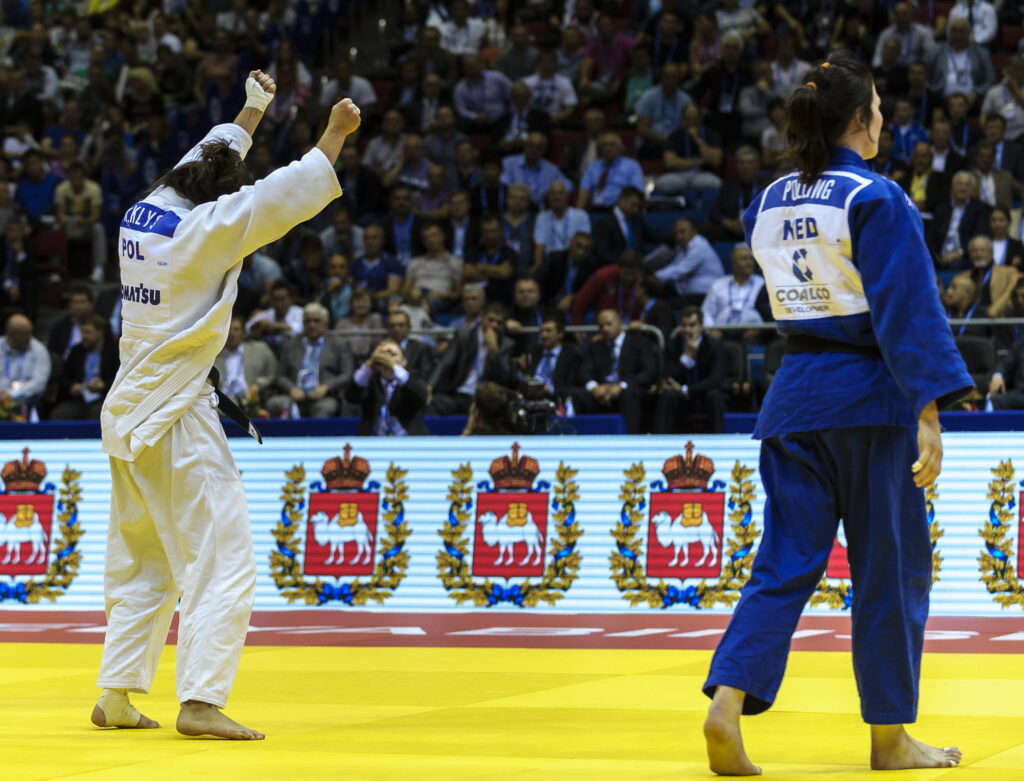
What did you feel?
In the end, I got what I wanted. I was looking for difficulty and there I was served… But then I felt shame. Everyone expected me to win and there it was: what happened to Kim? That’s when I started having panic attacks.
On site?
No, in September, when I returned. Chelyabinsk was at the end of August, and in September I had my first attacks. I didn’t want to leave my house anymore. I was too ashamed. And it really lasted a long time, to the point where I ended up telling Marjolein van Unen, my coach at the time, that I needed a break.
Did she grant it to you?
No, because there was a psychologist who said I had to manage to overcome this ordeal. And that to do that I had to continue training. They let me go to Tokyo in December that year. There I had to fight Gévrise Émane and obviously I lost. But I would have lost even if I had fought against someone else, you know. I didn’t want to be there and they pushed me to do it.
How did you react?
Around January or February, I decided to call my previous coach. I told him I wasn’t doing well, really not well at all, and that I didn’t know what to do. They told me two things: one, that I shouldn’t give up judo, but two, that I really needed a break. Then, I don’t know exactly how it happened, but the national technical director was also involved, and I got my break.
How did this break materialize?
I went back to my parents’ to live with them for a few months. And gradually things started to get better. I took the opportunity to change two or three things. In particular, I went back to Haarlem, to my old club—I had been in Rotterdam since 2012, at Chris de Korte’s, which was also Marjolein’s club. Coming back to Haarlem meant coming back to where I had spent my entire junior period and where I had all my friends.
Did this return to your roots do you good?
Yes, I felt much better in Haarlem. I was again with my friends, with my old club and coach Maarten Arens. In principle he was only the boys’ coach, but we talked, and we decided he would be mine too. It would be a challenge because I knew the boys would always come before me. But we had agreed and that was really good news.
Hence your late comeback that year?
Yes my first tournament of 2015 was in May at the Baku Grand Slam. I reached the final, where I lost in the last ten seconds against Sally Conway. But mostly I felt really happy and relieved to no longer feel any pressure. Then there were the Masters in Rabat, which I won. Then the European Games, again in Baku, which I also won. I then realized that I was coming out of a terrible year, that I had managed to come back and that I was starting to win everything again. And then there were the World Championships in Astana. There, I was just too happy to be back. I felt good even though in the end it wasn’t my day since I finished seventh. But it doesn’t matter, really. Mentally, I was just so happy to be back. I don’t think I ever really came back to my level from before that break but mentally I was really doing much better.
Did you ever relapse?
Of course… I remember that in 2016 I again had a moment of difficulty at the time of the Paris Grand Slam. I stepped out in the quarter-final at that event because I got a panic attack… There too we were right in the middle of discussions with the Federation. They wanted to centralize everything and I was having a really hard time with this idea. I didn’t know at that moment where I was going to go in September because I lacked clear information from the Federation. I just knew they wanted to change everything and were thinking of asking us to go to Papendal, but I had no other information. People close to me told me to stop worrying about it but for me it was really difficult not to know where I would be living after the Olympic Games.
This Olympiad will ultimately have been a constant struggle, despite your many titles during the same period…
It was for me, but also for the whole team. It’s actually crazy when I think back to see how things unfolded. Certainly, the Dutch Federation has always had room for improvement on the communication side—even now, there are still problems with that. But at that time, it was really complicated for everyone, athletes as well as coaches. As I was telling you, in March 2016, there were major tensions at the technical management level, with a letter of support written by all the athletes, etc. Three months before the Olympic Games, we found ourselves busy with things we shouldn’t have been busy with. It’s not ideal, but well, that’s how it is. The important thing is that mentally I was OK. Because the episodes of 2014 and 2015 left scars.
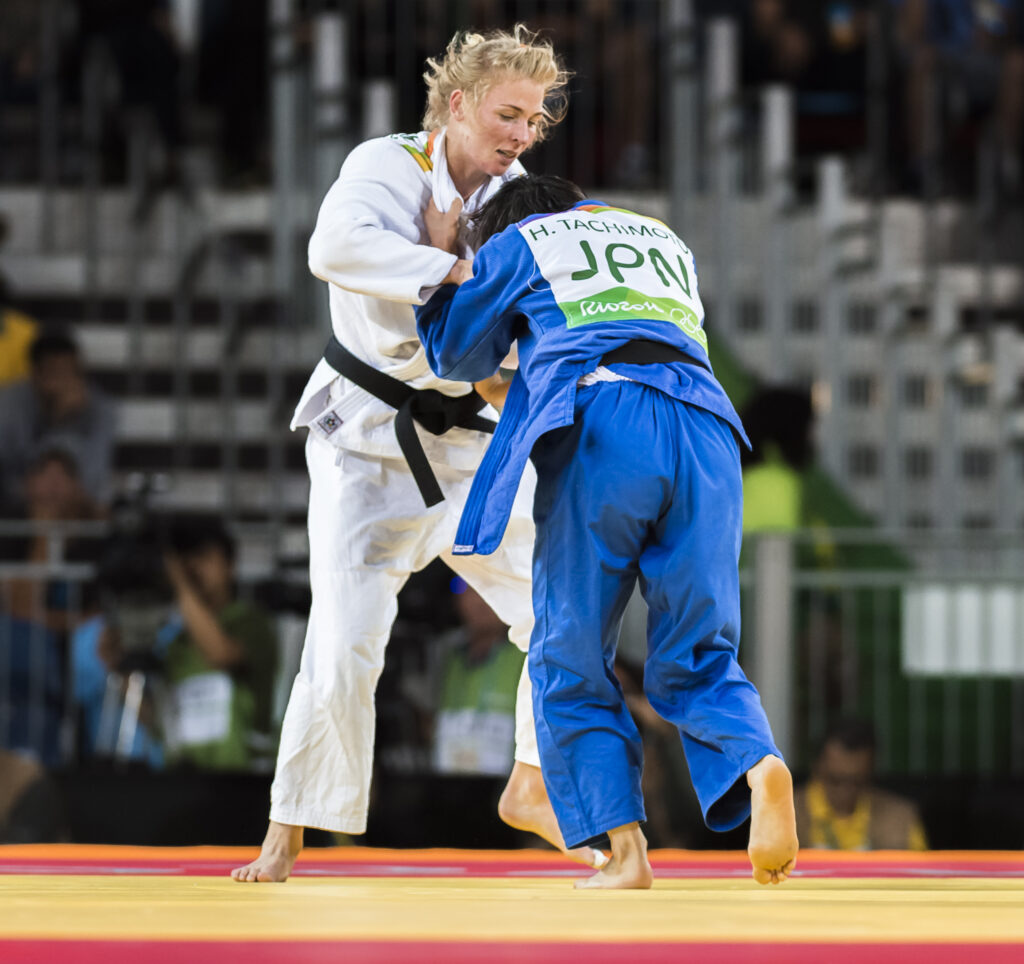
And here come the Rio Olympic Games where, despite your status as World number one, you drew Japanese judoka Haruka Tachimoto right from the start…
Yes, and that day I was fighting at exactly the same time as Noël van’t End, our U90kg. However, as we had agreed from the start, Maarten primarily followed the boys—and therefore Noël, on that day. We had planned for this scenario and it was Mark van der Ham, the other coach, who in principle took over. I felt good with him on the chair so it was OK. But it was also planned that Cor van der Geest, Dennis’s father, would be there to help me from the stands. What I didn’t know at that moment was that he was stuck in traffic…
Not ideal, especially if you feel a need to have your bearings…
Wait, because it’s not over: when I arrived in the warm-up area, I saw that Tachimoto was there with her coach, and they were practicing my ippon seoi nage. So I told myself as I approached that, OK, it’s not even worth trying ippon seoi nage, I’ll never score with it since they’re preparing specifically against it… The fight began and, in ten seconds, I scored yuko on… ippon seoi nage!
Surprising, indeed!
The problem is that I then entered complete confusion. I told myself no but how is this possible? Two minutes ago, I saw you training to defend against this movement with your coach. And in ten seconds, you fell for it… On top of that, not having Maarten next to me to calm me down, I started wondering: and Cor? Where is Cor? Where is Cor? I don’t hear Cor. Where is Cor? My head went into crisis. And I said, where is Cor? Where is Cor? Because Cor has a voice recognizable among all from the stands. And even if he had to shout from outside the stadium, I could have heard him… At that point, Tachimoto ended up equalizing and, in golden score, she scored again. Here I was eliminated, and without possible repechage.
How did you react?
I just felt too confused. I think everything went wrong. I had developed different scenarios beforehand, and we had ways to adapt if things went badly. But I think there were just too many things that weren’t right. Seeing Tachimoto training on my technique. Making her fall for it anyway. Cor wasn’t there. Maarten wasn’t there. In short, I think there was only one scenario we hadn’t anticipated and it was this one… I felt confused, yes.
Did it console you to see that Haruka Tachimoto then went all the way through the day, since she’s the one who won the Olympic title in the end?
A little. At least, I couldn’t say I had been beaten by just anyone… For the rest, even though I told myself there had been parameters I couldn’t control, the fact is that the feeling of shame came back.
Shame?
Yes, shame. Because everyone expected me to win, or at least to win a medal. And it was over after just one fight… Back in the Netherlands, it was even worse. You know, we had a Volkswagen on the side of which was written « Olympic athlete. » The Olympic Games were still ongoing and I was back home in my car and everyone: « Oh, but you went to the Olympic Games? How did it go? »
You wanted to hide…
Yes. I went to Italy before going home. A really difficult period. I had lost at the Olympic Games. I would have liked to have at least one more fight and go for bronze, for example. Whereas there it was just over in five minutes… And then there were still the problems at Papendal. We got to September and nothing was clear. That’s when we made the decision that I would go and settle in Italy.
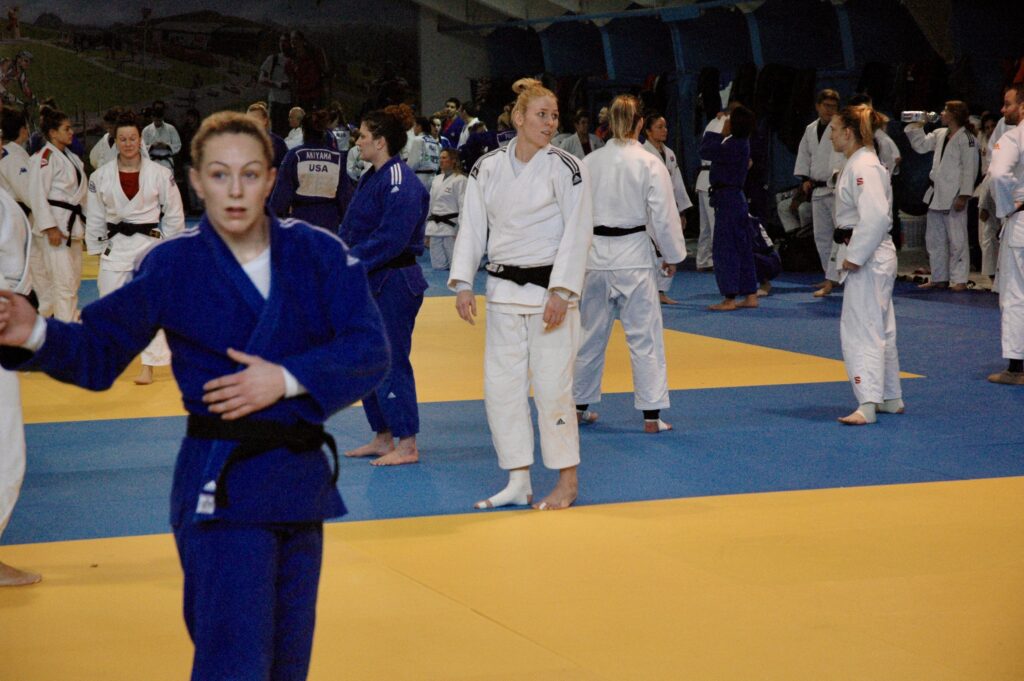
From our very first interview in 2013, you had told me you’d been treated since childhood for ADHD (attention deficit disorder with or without hyperactivity). We talked about it again during a long feature for Judo Canada. How did you manage this parameter during your career?
Having been diagnosed at the age of four, I learned to manage it over time. Of course it affects me but eventually I got used to it. Beyond myself, it’s my daughter I think about today. I really hope she doesn’t have it too. Because of course it has advantages—and my judo style is there to testify to it since I often score from the very first sequence. But there are also many negative sides. For the general public, it’s just hyperactivity and concentration problems. In reality it’s much more and it’s sometimes complicated to manage. Emotionally, you quickly go through highs and lows without understanding why. For my part I have my medications that generally help regulate that, and I observe how my daughter evolves. I have to say that for now, she’s a lot like me. The future will tell us what it is. In any case Andrea, he knows me well. He knows how to manage.
Now that you’ve stopped competing, do you feel more stable at that level or do you still have these highs and lows, sometimes?
It’s more stable because I have less stress than before. But I still pay attention. This month for example, I have so much to do that I felt the need to have at least one day off per week. Because if the schedule is too busy, there’s a real risk of not managing to do anything, simply from not knowing where to start… Often the important thing is just to manage to start and then it’s fine. When I stopped judo, I just took everything that came my way telling myself « Oh, that’s nice! Oh, that’s nice too. » I try to prioritize the things I like, while making sure not to unnecessarily overload the boat.
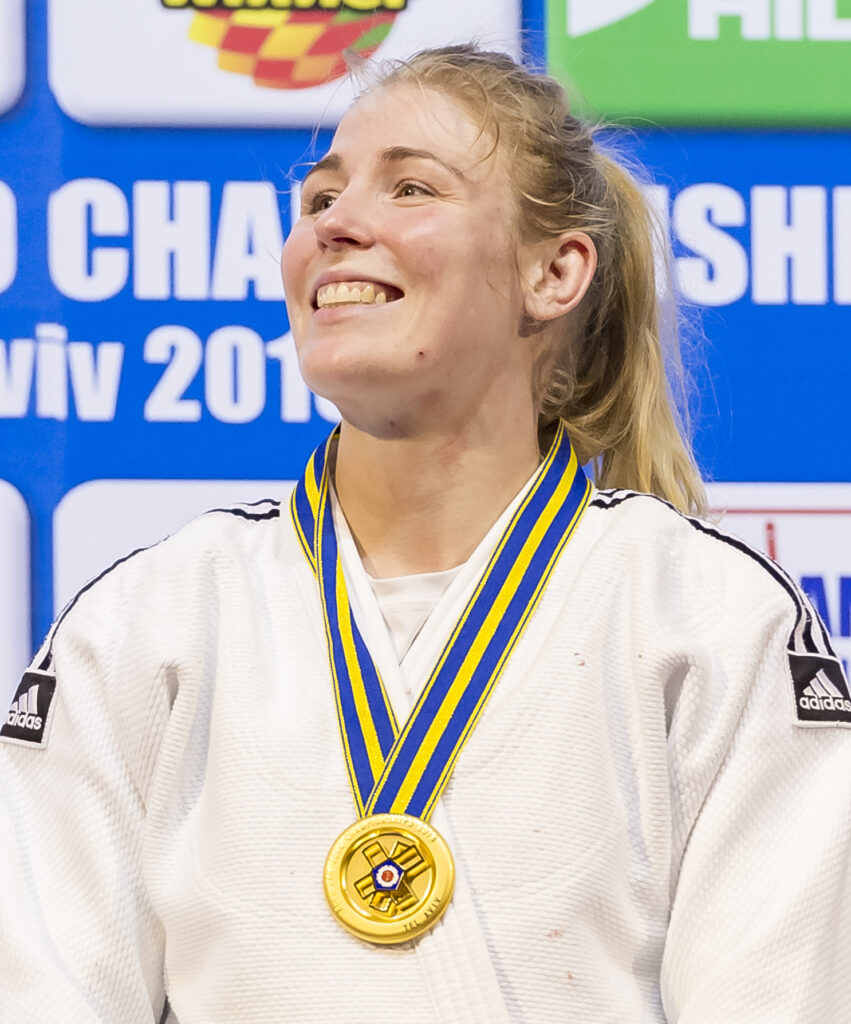
The Olympic cycle that began after the Rio Games saw the rise of a new U70kg judoka in the Netherlands — Sanne van Dijke, four years younger than you — who won the first European title of the Olympiad in 2017. How did you view the arrival of this national rival?
After Rio, I had surgeries on my elbow and knee. I only came back a year later, at the World Championships in Budapest. In the meantime, Sanne had won the European Championships in Warsaw. I reclaimed that continental title the following year in Tel Aviv by defeating her in the quarterfinals… It was my fourth European title in six years, and for me, there wasn’t really any rivalry between us.
And yet, things eventually changed…
Where things started to shift was after those European Championships, when I developed a hernia. That injury kept me off the tour for another year. During that time, Sanne seized her chance and broke into the world’s Top 10. When I returned, in the spring of 2019, it was difficult because I had to deal with something new: I was afraid for my back. The fear was mainly mental, because the hernia had come out of nowhere. Suddenly, I couldn’t move my legs and felt sharp pain, even though nothing I had done before seemed risky. I even had to undergo surgery, because I was told that nine out of ten people recover naturally — and of course, I was the one out of ten who didn’t [smiles]. It took me a while to stop feeling that fear.
From when did you start to feel more confident again?
I came back in March, but it wasn’t until late July, at the Zagreb Grand Prix, where I finished second, that I started to get my rhythm back.
That same year, however, you were once again eliminated early at the World Championships in Tokyo…
Ah, Tokyo… The worst part is that I actually felt really good that day. I won my first fight in twenty seconds, and in my second match I scored right away against María Perez. The problem was that during the action she complained of arm pain caused by my attack, and I was given hansoku make. To me, the situation was confusing and totally unintentional. But in the end, whether I meant it or not, I fell on her arm, and that earned me a disqualification. I was furious, especially since I finally felt like myself again, and even Marie-Ève Gahié, who won the World title that day, came to tell me she couldn’t understand the decision.
You confirmed that return to form by finishing 2019 on a high note…
Yes, I won the Abu Dhabi Grand Slam, finished second at the Osaka Grand Slam, and won the Qingdao Masters. At that point in the Olympic cycle, I was well ahead in the race for qualification to the Tokyo Games. And then came covid…
Did that change anything for you at that moment?
Not really, because the Dutch Federation announced that the Olympic qualification criteria would remain the same. So I was quite calm. If nothing changed, I was the one going to the Olympic Games… Then came 2021 – the year the Tokyo Games were postponed. The three important tournaments were the Doha Masters, the Tel Aviv Grand Slam, and the European Championships in Lisbon. I won a medal at the Masters, and Sanne didn’t. In my mind, that settled it.
And yet, that was far from being the case…
Yes, because a month later in Tel Aviv, I lost to her for the bronze medal — for the first time in seven encounters. She played it smart. As for me, I still wasn’t worried about the Olympics, especially since the level at that Grand Slam was lower than at the Doha Masters… Then came the European Championships in Lisbon. Once again, many athletes were missing, except for the Frenchwomen Pinot and Gahié, who were also fighting for Olympic selection. In my head, I thought: whatever happens here won’t really matter… And then I injured my elbow. Sanne qualified for the final, and I had to fight for bronze against the Russian Taimazova, whose judo doesn’t suit me. Why risk worsening my injury three months before the Games? Especially since Sanne’s opponent in the final was Margaux Pinot — and Pinot is tough. So I decided to forfeit the bronze medal match… But then Sanne won her final.
Did that worry you in the moment?
Not for a second. It was one of the possible outcomes, and it happened. But aside from that, looking at the whole Olympic cycle, I was still ahead. And then, a few days later, I learned that only the last three tournaments would be counted for Olympic selection.
And that’s when Sanne overtook you…
Yes — except you can’t change the rules after the fact! If I had known they would only consider the last three tournaments… When Sanne qualified for the European final, it guaranteed her a second medal out of those three tournaments. If I’d known those were the new criteria, I would never have withdrawn, because I could also have aimed for a second medal in that span. The thing is, no one told me that the criteria had changed mid-way.
You went to court over it, right?
Yes! I did, but it didn’t lead anywhere because, legally speaking, they had technically stuck to the criteria. From my perspective, there were mistakes in the statistics, but by then it was too late — nothing could be done.
How did you cope with the news?
You know, I’ve always seen 2014 as the lowest point of my career. But what happened in 2021 felt like a real injustice. They should have told me back in January that they would only look at the last three tournaments. It was even harder to swallow knowing there were other strong rivalries in different weight categories back home — in the O100kg category with Henk Grol and Roy Meyer, and in the O78kg with Marhinde Verkerk and Guus Steenhuis. For those two divisions, the entire Olympic cycle was taken into account. But for Sanne and me, it wasn’t. I found — and still find — that really unfair. Not because it was Sanne who went to the Games, but because of the way it all unfolded.
What do you take away from it, four and a half years later?
In the end, I think that episode mostly helped me with getting the Netherlands to agree to my nationality change to Italy [smiles].
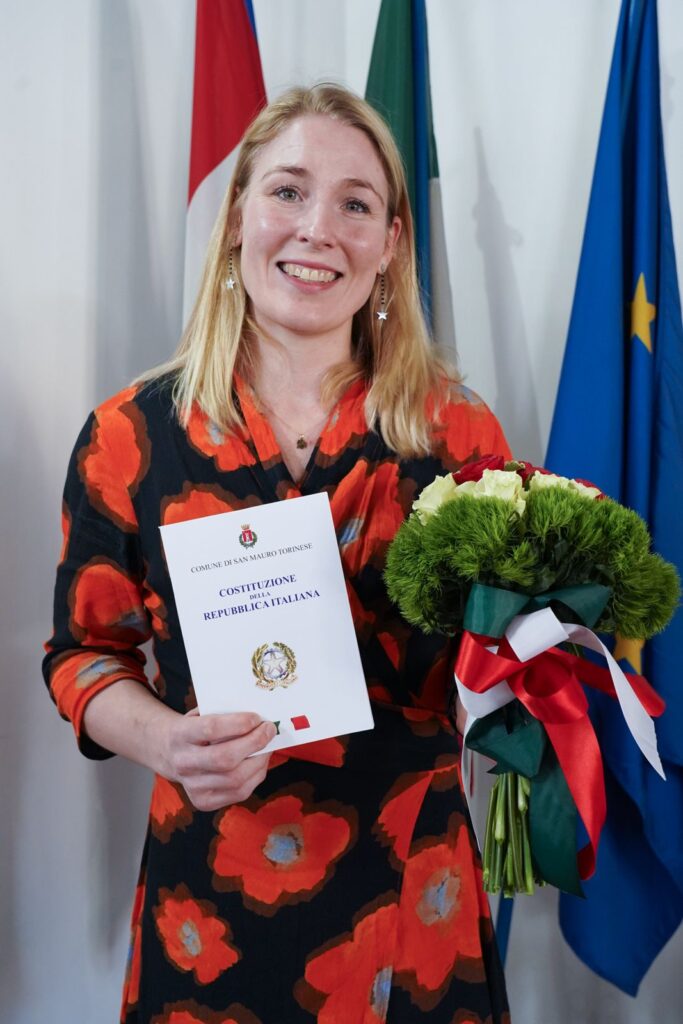
So, how did that all happen? Normally, this process can last several years. Yet, in the spring of 2024, barely five weeks passed between your last Grand Slam under the Dutch flag on March 30 in Antalya, and your first one for Italy on May 11 in Astana…
Actually, it was in January 2024 that we discovered the age limit to enter a military group had been raised from thirty to thirty-five. Because, of course, back in 2016 when I decided to move to Italy, we had already spoken with the Italian Federation to see if I could compete for Italy. The thing is, in 2016, I didn’t feel Italian at all. I didn’t even speak the language! Another important factor at the time was that my relationship with Andrea was still very new. I wondered what would happen if, for some reason, things didn’t work out between us and I ended up competing for Italy. That’s why I decided to keep representing the Netherlands.
I imagine the tensions in 2021 during the Olympic selection also played a role in your later decision…
It was too late then to change nationality, because I was too old to enter a military group. At that time, the age limit was still thirty, and I was thirty-one. Changing nationality after the 2021 Olympics wasn’t an option, since I couldn’t get the financial support that comes with joining a military group.
But you said everything changed at the beginning of 2024…
Yes, that day my husband got a phone call about an athlete who was going to join a military group. I was in the car with him, so I heard the conversation. Then I realized that the athlete in question was over thirty. How was that possible? Andrea told me no, that he was younger — just a few years younger than me. But I was sure of what I’d heard. So I checked, and indeed, he was over thirty… After some research, we found out that the age limit had indeed been raised from thirty to thirty-five a few months earlier.
Which was a decisive breakthrough for you!
Yes, especially since Andrea had always been afraid that I wouldn’t be able to find work in Italy. Joining a military group guarantees me a lifetime salary. I mean, when you’re an athlete, that’s your job — but within the Army, they find a role for you. Or within the police or the financial guard — there are different kinds of military groups. And that’s great when you start thinking about your future. And, of course, at that time Italy didn’t have any U70kg athlete qualified for the Olympic Games. So it was a win-win situation for both me and the Italian Federation, both for the individual tournament and the mixed team event. At that moment, Italy didn’t have competitive U63kg or U70kg judokas, which meant that U57kg Veronica Toniolo had to fight up in U70kg. So if I came in, it meant at least there would be a true -70 kg competing in her own category, plus Veronica Toniolo and Odette Giuffrida available for U57kg. So, fundamentally, I was really interested.
And everything happened very fast, right?
We still can’t believe how quickly everything happened. In four months, everything was arranged. You have to know that, in principle, the Dutch government doesn’t allow dual nationality. If I were to obtain only Italian citizenship, I would lose my Dutch one — except if I married Andrea, because if you take your partner’s nationality, you’re allowed to keep both. So to sum up: that phone call was on January 4, and by February 24, Andrea and I were married. I sent my application for Italian nationality. Luckily, we met exactly the right people involved at each step throughout the whole process. One month after applying, I received Italian citizenship — even the Italian Federation said they had never seen a case processed so quickly. Of course, the upcoming Olympic Games probably helped… So by the end of March, I was officially Italian. The next step was convincing the Dutch Judo Federation. And I think that’s what scared me the most, especially after the tensions in 2021. After all, by strengthening Italy, I was also creating an additional competitor for the Netherlands.
Yet, especially in your U70kg category, you weren’t the first to change nationality. I remember Esther Stam and Linda Bolder, who qualified for the Rio Olympics under the flags of Georgia and Israel, respectively…
Yes, except that since 2017 the Netherlands hadn’t allowed anyone to change nationality — unless they accepted to wait for the three-year period. But when they heard my story, they were surprisingly positive right away. For me, it wasn’t only about the Olympics, but also about my future. I sent an email to officially request the nationality change during the Antalya Grand Slam, which became my last tournament for the Netherlands. A few days later, I received approval from the Dutch Judo Federation! After that, everything moved just as fast. I got my passport around April 10, which allowed me to take part in the Astana Grand Slam a month later, and then the World Championships in Abu Dhabi right after. That also allowed me to secure my Olympic qualification.
Your world ranking wasn’t reset after the nationality change?
No, because since the Tokyo Olympics, if you change nationality, you keep your points. So really, everything happened like in a fairy tale… And then, a week before the World Championships, I started feeling pain in my hip. I booked an MRI appointment and began to feel tingling in my feet and legs. I went to the doctor, who told me I had all the symptoms of hip bursitis. But to me, the symptoms felt a lot like my previous hernia. They insisted it wasn’t that, but I wasn’t convinced. So I went to CONI, the Italian National Olympic Committee, where the Federation has an amazing medical center. I asked them to do a back MRI in addition to the hip one. And it turned out to be a hernia after all.
How did you treat it?
In Italy, there was an experimental therapy at that time. They go into your back and remove the hernia with a laser. It’s really experimental, but we were only a month and a half away from the Olympic Games. The time frame was too short for surgery. And the laser treatment worked — the pain disappeared. I managed to train again for two or three weeks. Then the pain came back, and I spent my last two weeks before the Games mostly cycling. I was basically just trying to survive.
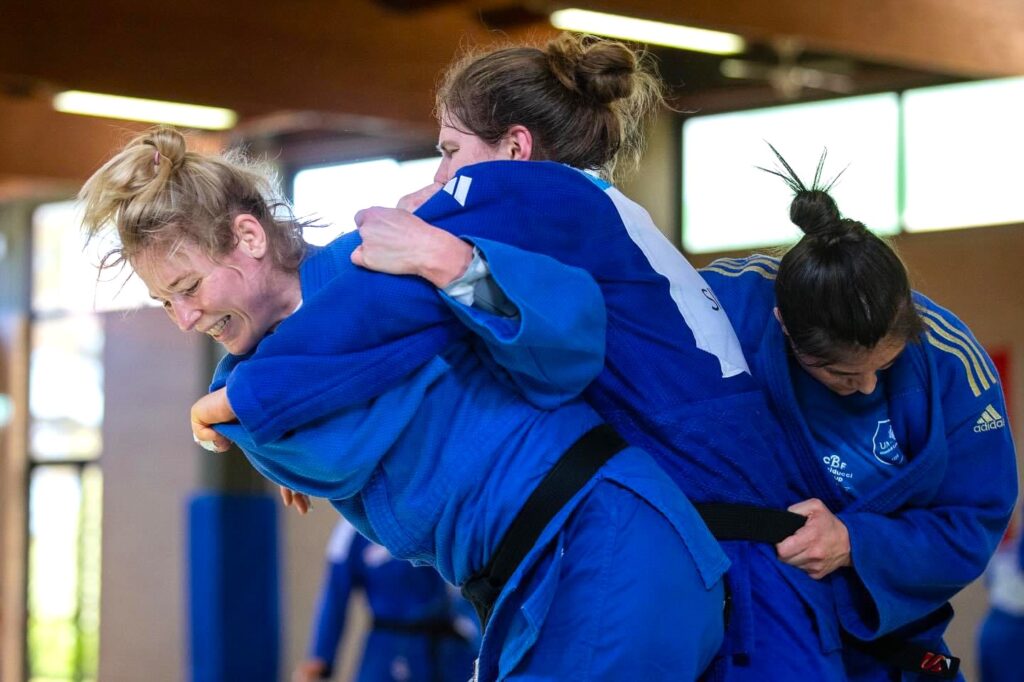
At the Paris Olympics, unlike in Rio, you weren’t the No. 1 seed. This time, that status belonged to Croatia’s Barbara Matić — the reigning European champion and double World champion of this Olympic cycle. And she stood in your way as early as the second round…
Before facing her, I had to fight the Portuguese judoka Tais Pina, who had beaten me twice in a row that spring… Paradoxically, I was more nervous about facing Pina than Matić, because Matić’s judo generally suits me well [Polling was leading 7–1 in their head-to-heads, ed.note]. The only problem was my hernia, which stopped me from fully committing. I did what I could. This time, I got past Pina — but not Matić. Just like in Rio eight years earlier, I lost to the eventual Olympic champion.
So, no regrets?
I focus on the positives. I really loved the atmosphere — and the fact that Aurora could be there to witness it all. I also really enjoyed being part of this Italian team, which gives you a stronger feeling of togetherness than what I experienced with the Dutch team.
Yes, that team spirit was visible again this year during the mixed team event at the European Championships in Podgorica, when Veronica Toniolo got injured in the final and her teammates held up her pink Crocs with the initials “V” and “T” on the podium…
Actually, I already knew most of them through Andrea. I knew that closeness was part of their identity, and I immediately felt at home among them. So in the end, if you forget about judo itself, these Games were really nice — I truly enjoyed the event. I didn’t know at the time that it would be my last tournament, but now, I’m glad it was. At least I got to enjoy it. I had a fantastic team, and being there — after all those years of training with Aurora, after the disappointment of Tokyo — to experience it like that, I think it was a good way to end things.
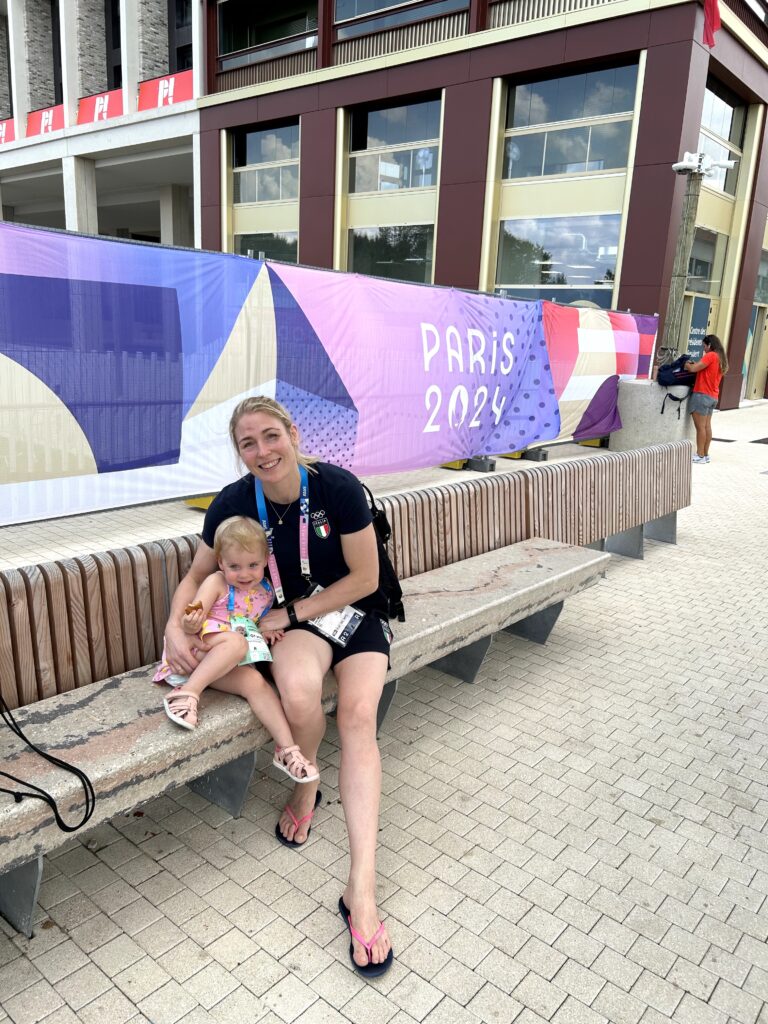
Speaking of the mixed team event, we can’t not mention the emotion you showed after your two matches against your former teammate Hilde Jager at the World Championships in Abu Dhabi — when Italy, your new team, eliminated the Netherlands, your lifelong team…
It was crazy. During the individual event, my pain had flared up again, and I had no intention of fighting in the team competition. But that morning, my coach Francesco Bruyere came to me and said: “Kim, you have to fight against the Netherlands, otherwise we won’t win. It’s just one match. You won’t fight again for the rest of the day.” I said, “Alright, fine.” But then I told him, “No, there’s a real chance I’ll have to fight twice. If you’re telling me now that it’ll be close, there’s a real risk we’ll end up 3–3 — and if there’s a draw, I’m sure it’ll be my category that gets picked.” He said, “No, no, let’s see what happens…” And, of course, that’s exactly what happened: I beat Hilde, it’s 3–3, they draw lots, and the U70kg category gets called again… If you rewatch the footage, you can actually see me smiling and starting to laugh while looking at Francesco — because I knew it. They say the draw is random, but it’s really not random at all. Luckily, I won, and that’s what mattered most.
But that victory really shook you up…
You know, in the moment, I wasn’t thinking about Italy or the Netherlands at all. It was only afterward, once the victory was secured, that I realized I had just sent the Netherlands home. And that hit me hard. A large part of the Dutch team really didn’t like me at that moment. But well, that’s how it is. And we won the bronze medal… The previous year, I had also won bronze — but with the Dutch team. This time, it was with the Italian team.
What went through your mind as you stood on the podium?
I looked at the flag in front of me and thought: “Okay, what just happened over the past month? This is just crazy.” Up to that point, it really felt like a fairy tale. And I didn’t want to wake up.
What happened when you saw Hilde Jager and the Dutch team again in the warm-up area? Did you talk about it?
Yes, because Hilde is also a friend. It was an emotional moment for both of us. And the coaches were very gracious — they told me, “Don’t worry, Kim, that’s part of the game. You don’t have to feel guilty, it’s just how it goes. You did your job, and you did it well.” The thing is, in the Netherlands, the funding athletes receive from the government depends on results. So it was also very important for the Dutch team to win a medal — or at least finish seventh — because that would have allowed some of the athletes to receive their stipend for another year. In the end, I still did an interview with Hilde for a Dutch TV channel. I was injured, but I had done my part by helping my team beat the Netherlands. After that, I could finally take a step back, process all the emotions of the day… and start healing.
So, to sum it up: you took part in the Olympic Games twice — and each time you were eliminated right away by the eventual champion. You also won four European titles between 2013 and 2018. But at the World Championships, you had to settle for that single bronze from your very first participation in 2013. Back then, did you expect that it would be the only individual world medal of your career?
Not at all. And neither did the people around me. But every year, there was a different reason. In 2013, I arrived injured. In 2014, I was mentally exhausted. In 2015, I was just too happy to be there — and not focused enough. In 2017, I was coming back after a year off. In 2018, I wasn’t there because of my hernia. In 2019, there was that incident with María Perez’s arm. In 2021, I didn’t compete because I was too disappointed about missing the Olympics. In 2022, I had just given birth. In 2023, I felt good, but I lost for the first time against Matić, who was simply better that day. And then in 2024, I had a good competition, but I realized that after pregnancy, my body had changed. Of course, I still managed to qualify for the Olympics, so I can’t say I was no longer performing — but my body was definitely not the same.
In France, Clarisse Agbégnénou also spoke a lot about her experience of motherhood…
I haven’t talked with her about it in a while, but I know she also deeply wanted to become a mother. Clarisse still achieved amazing results, but her body changed too. For example, I can’t do ura-nage anymore because my stomach and posture have changed. And since ura-nage was one of my main weapons, without that technique, I’m less dangerous. When I could do it, opponents were afraid of it and gave me space for other attacks. Without that fear, I’m less threatening. So yes, I’m incredibly happy to have become a mom — it was something I truly wanted — but it has changed my body forever.
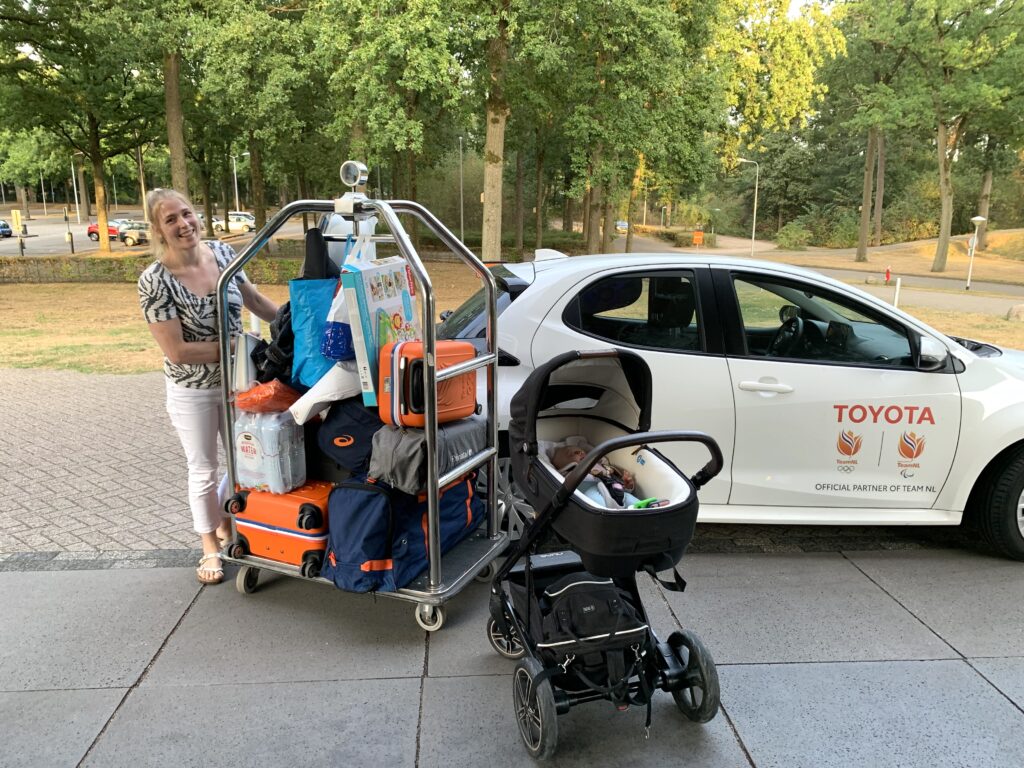
Did you consider retiring after the birth of your daughter?
At first, I thought I would stop after the Tokyo Games. But since I couldn’t go, I told myself, “No, I don’t want to finish like this.” At the same time, I wanted to become a mother. And it was Andrea who said to me, “You can do both.” I had never considered it before. Then, by coincidence, Clarisse also became a mother, Nekoda Smythe-Davis as well. And even in the Netherlands, in other sports, several women had children and came back. There was this shared energy, a connection among all these women.
Do you think the fact that the Tokyo Olympiad lasted five years influenced your decision?
Yes, I think so. It was a crazy period. If you compare it to previous Games, everything was disrupted. In the Netherlands, nothing had been set up to support athletes becoming parents. There were no accommodations, no specific programs. So I think the fact that this Olympiad lasted five years simply shifted everything, postponed everything. Add to that the lockdown. In Italy, we were stuck at home, unable to train. I think it was similar in many places around the world, but in Italy, it was particularly strict: two or three months of nothing. In the Netherlands, at least they could go out even if the training center was closed… It was a really strange period: we couldn’t progress in judo, but we couldn’t move forward in our personal lives either. The next step should have been a baby, but Andrea and I didn’t feel completely ready yet, so… we got a dog! It was our compromise [laughs]. It’s a bit silly, but it filled the gap. And maybe mentally, it awakened something in us, a kind of call.
For Clarisse, it’s something very strong, almost a mission. She also wants to change mindsets, because before, pregnancy often meant the end of a career.
Exactly. And that’s true. So yes, what we’ve done — with Clarisse, Nekoda, and others — is something new. We’ve shown that it’s possible to continue performing while being mothers. Of course, it requires enormous organization — but it is possible. And I find it beautiful. Because many athletes, when they stop, feel a bit lost. Whereas when you have a child, you don’t have time to think: your priorities change immediately. You go from the tatami to diapers, literally [laughs]. It’s a revolution.
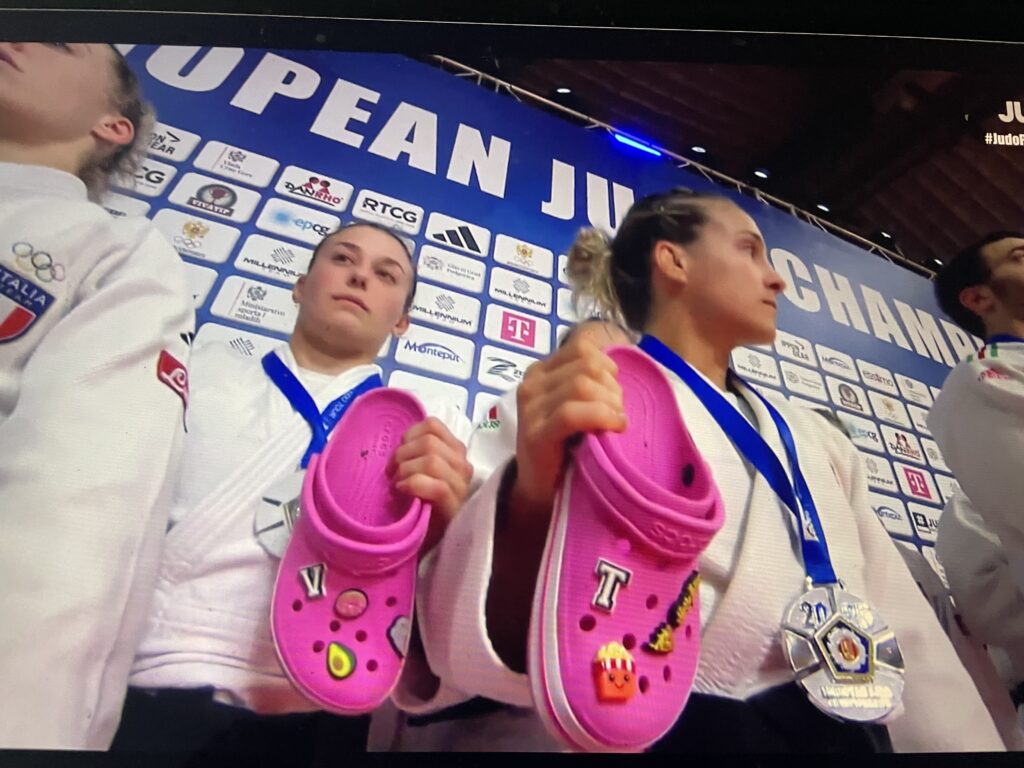
Having experienced both systems — the Netherlands and Italy — how do you see their future?
The Netherlands have seen better days. Papendal isn’t working very well anymore. Since this summer, half the team has left. Only about twenty athletes remain there, without enough training partners. Many have returned to their clubs, like before 2016. Back then, we liked the system: everyone trained at their club, and then we regularly met for joint training camps in the center of the country, near Utrecht. It was more balanced: you could study, have a private life, and train seriously. But when we were forced to centralize everything at Papendal, everything deteriorated. Fortunately, things are moving in a positive direction: Guillaume Elmont is now the technical director of the Dutch Judo Federation, Marjolein van Unen has become president of the Federation, and Mark van der Ham returned as a coach. So finally, there’s a positive breeze, with experienced people. I really hope the Netherlands become a strong nation again, because before, it was a formidable country.
And Italy?
Italy is doing well. They have more structures, and the big difference is the team spirit. In the Netherlands, before Papendal, we were a real, tight-knit group. Later, everyone started thinking about themselves. In Italy, it’s different. Even if they sometimes make personal choices, deep down they support each other. It’s part of their culture, their way of being. It’s a warmer, more social country. I really hope the Netherlands bounce back, because there are so many talented judokas there. It would be sad to lose all that.
And what would you like people to remember from your career? Your judo? Your attitude? Your journey with all its highs and lows?
I’d like them to remember my style of judo. I think my judo was spectacular and enjoyable to watch. My ura-nage, my utsuri-goshi, my unpredictable attacks… That’s what I’d like people to remember, more than my personality. Because I’m not the most social person, you know [laughs].
Oh really?
For example, this year I went to the World Championships in Budapest to present myself to the Athletes’ Commission. The idea came from the Italian Federation. I agreed, but of course, if I was presenting myself, I wanted to win. So I went to the athletes in the warm-up area to ask them to vote for me. And there, Toma Nikiforov says to me: “But Kim, you’ve never spoken to me your whole life!” I said, “Really?” He insisted, “Yes, never!” And it’s true: I don’t talk much, especially before a competition. Some might have thought I was arrogant, but that’s not the case. I’m just reserved. My husband Andrea is the opposite: he talks to everyone. I’m more discreet. I think I only speak when I feel I like the person. It’s instinctive. So I don’t really know what people think of me, but if I could choose, I’d like them to just remember my judo.
If the 2025 Kim could give advice to the 1997 Kim starting judo, what would you say?
Good question… I think I’d simply say: “Don’t change anything.” Because if I look at my life today, I’m happy. With Andrea, with Aurora, where we live, the life we have… I’m fulfilled. Of course, when I think about judo, I feel a little pang in my heart: I didn’t exploit my full potential. But if I hadn’t left the Netherlands in 2016 to come to Italy, would I have been happier? I don’t think so. Maybe I would have had better results, but I would have been unhappy. So in the end, it all balances out.
Because judo isn’t just about medals…
Yes, it still hurts that I wasn’t a World or Olympic champion. But Aurora’s birth changed everything: she showed me there’s something far more important than judo, even if this discipline gave me everything — Andrea, my current life, my values, my inner strength. Everything comes from judo… If I were to give one piece of advice to my younger self, it would be to seek psychological support sooner. In 2013, when I started winning everything, I should have seen a psychologist. It might have prevented the 2014 crisis. That’s the only thing I’d change. Everything else, no. I’m happy with who I am today.
On the mental side of performance, attitudes have been shifting in recent years…
Yes, and I think that’s wonderful. I’ve seen junior World championship medalists accompanied by their mental coaches. In my junior days, it was unthinkable to have a mental coach. And even today, for many, admitting to receiving that kind of support is still difficult — as if there’s a taboo. In fact, it’s like with pregnancies: it’s not perfect yet, but it’s increasingly accepted. Mindsets are evolving, and I’m happy to have perhaps contributed a little to that. — Interview by Anthony Diao, autumn 2025. Opening picture: ©Paco Lozano/JudoAKD.
A French version of this interview is available here.
More articles in English:
- JudoAKD#001 – Loïc Pietri – Pardon His French
- JudoAKD#002 – Emmanuelle Payet – This Island Within Herself
- JudoAKD#003 – Laure-Cathy Valente – Lyon, Third Generation
- JudoAKD#004 – Back to Celje
- JudoAKD#005 – Kevin Cao – Where Silences Have the Floor
- JudoAKD#006 – Frédéric Lecanu – Voice on Way
- JudoAKD#008 – Annett Böhm – Life is Lives
- JudoAKD#009 – Abderahmane Diao – Infinity of Destinies
- JudoAKD#010 – Paco Lozano – Eye of the Fighters
- JudoAKD#011 – Hans Van Essen – Mister JudoInside
- JudoAKD#021 – Benjamin Axus – Still Standing
- JudoAKD#022 – Romain Valadier-Picard – The Fire Next Time
- JudoAKD#023 – Andreea Chitu – She Remembers
- JudoAKD#024 – Malin Wilson – Come. See. Conquer.
- JudoAKD#025 – Antoine Valois-Fortier – The Constant Gardener
- JudoAKD#026 – Amandine Buchard – Status and Liberty
- JudoAKD#027 – Norbert Littkopf (1944-2024), by Annett Boehm
- JudoAKD#028 – Raffaele Toniolo – Bardonecchia, with Family
- JudoAKD#029 – Riner, Krpalek, Tasoev – More than Three Men
- JudoAKD#030 – Christa Deguchi and Kyle Reyes – A Thin Red and White Line
- JudoAKD#031 – Jimmy Pedro – United State of Mind
- JudoAKD#032 – Christophe Massina – Twenty Years Later
- JudoAKD#033 – Teddy Riner/Valentin Houinato – Two Dojos, Two Moods
- JudoAKD#034 – Anne-Fatoumata M’Baïro – Of Time and a Lifetime
- JudoAKD#035 – Nigel Donohue – « Your Time is Your Greatest Asset »
- JudoAKD#036 – Ahcène Goudjil – In the Beginning was Teaching
- JudoAKD#037 – Toma Nikiforov – The Kalashnikiforov Years
- JudoAKD#038 – Catherine Beauchemin-Pinard – The Rank of Big Sister
- JudoAKD#039 – Vitalie Gligor – « La route prend celui qui marche »
- JudoAKD#040 – Joan-Benjamin Gaba and Inal Tasoev – Mindset Matters
- JudoAKD#041 – Pierre Neyra – About a Corner of France and Judo as It Is Taught There
- JudoAKD#042 – Theódoros Tselídis – Between Greater Caucasus and Aegean Sea
- JudoAKD#044 – Kevin Cao (II) – In the Footsteps of Adrien Thevenet
- JudoAKD#045 – Nigel Donohue (II) – About the Hajime-Matte Model
- JudoAKD#046 – A History of Violence(s)
- JudoAKD#047 – Jigoro Kano Couldn’t Have Said It Better
- JudoAKD#048 – Lee Chang-soo/Chang Su Li (1967-2026), by Oon Yeoh
Also in English:
- JudoAKDReplay#001 – Pawel Nastula – The Leftover (2017)
- JudoAKDReplay#002 – Gévrise Emane – Turn Lead into Bronze (2020)
- JudoAKDReplay#003 – Lukas Krpalek – The Best Years of a Life (2019)
- JudoAKDReplay#004 – How Did Ezio Become Gamba? (2015)
- JudoAKDReplay#005 – What’s up… Dimitri Dragin? (2016)
- JudoAKDReplay#006 – Travis Stevens – « People forget about medals, only fighters remain » (2016)
- JudoAKDReplay#007 – Sit and Talk with Tina Trstenjak and Clarisse Agbégnénou (2017)
- JudoAKDReplay#008 – A Summer with Marti Malloy (2014)
- JudoAKDReplay#009 – Hasta Luego María Celia Laborde (2015)
- JudoAKDReplay#010 – What’s Up… Dex Elmont? (2017)
And also:
- JudoAKDRoadToLA2028#01 – Episode 1/13 – Summer 2025
- JudoAKDRoadToLA2028#02 – Episode 2/13 – Autumn 2025
JudoAKD – Instagram – X (Twitter).

